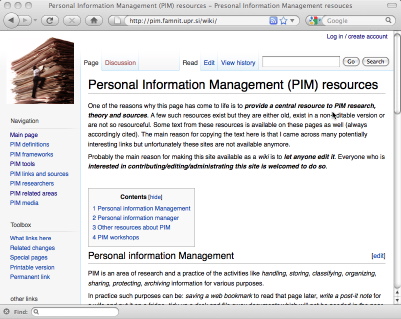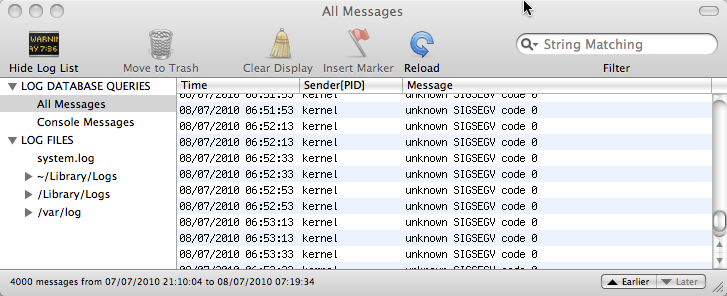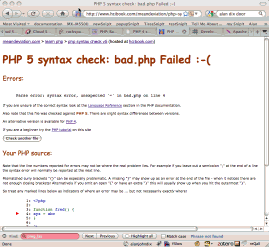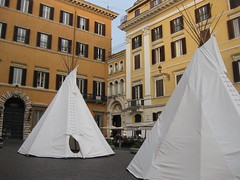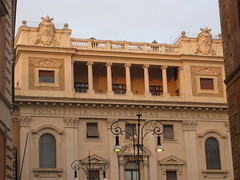Matjaz has just set up a personal information management (PIM) resource portal. There have abeen a few good resource lists in the past, but none have been maintained for a few years. It is a wiki so can be updated by anyone in the community. See Matjaz’ post about it.
Apache: pretty URLs and rewrite loops
[another techie post – a problem I had and can see that other people have had too]
It is common in various web frameworks to pass pretty much everything through a central script using Apache .htaccess file and mod_rewrite. For example enabling permalinks in a WordPress blog generates an .htaccess file like this:
RewriteEngine On
RewriteBase /blog/
RewriteCond %{REQUEST_FILENAME} !-f
RewriteCond %{REQUEST_FILENAME} !-d
RewriteRule . /blog/index.php [L]
I use similar patterns for various sites such as vfridge (see recent post “Phoenix rises“) and Snip!t. For Snip!t however I was using not a local .htaccess file, but an AliasMatch in httpd.conf, which meant I needed to ask Fiona every time I needed to do a change (as I can never remember the root passwords!). It seemed easier (even if slightly less efficient) to move this to a local .htaccess file:
RewriteEngine On RewriteBase / RewriteRule ^(.*)$ code/top.php/$1 [L]
The intention is to map “/an/example?args” into “/code/top.php/an/example?args”.
Unfortunately this resulted in a “500 internal server error” page and in the Apache error log messages saying there were too many internal redirects. This seems to be a common problem reported in forums (see here, here and here). The reason for this is that .htaccess files are encountered very late in Apache’s processing and so anything rewritten by the rules gets thrown back into Apache’s processing almost as if they were a fresh request. While the “[L]”(last) flags says “don’t execute any more rules”, this means “no more rules on this pass”, but when Apache gets back to the .htaccess in the fresh round the rule gets encountered again and again leading to an infinite loop “/code/top/php/code/top.php/…/code/top.php/an/example?args”.
Happily, mod_rewrite thought of this and there is an additional “[NS]” (nosubreq) flag that says “only use this rule on the first pass”. The mod_rewrite documentation for RewriteRule in Apache 1.3, 2.0 and 2.3 says:
Use the following rule for your decision: whenever you prefix some URLs with CGI-scripts to force them to be processed by the CGI-script, the chance is high that you will run into problems (or even overhead) on sub-requests. In these cases, use this flag.
I duly added the flag:
RewriteRule ^(.*)$ code/top.php/$1 [L,NS]
This should work, but doesn’t. I’m not sure why except that the Apache 2.2 documentation for NS|nosubreq reads:
Use of the [NS] flag prevents the rule from being used on subrequests. For example, a page which is included using an SSI (Server Side Include) is a subrequest, and you may want to avoid rewrites happening on those subrequests.
Images, javascript files, or css files, loaded as part of an HTML page, are not subrequests – the browser requests them as separate HTTP requests.
This is identical to the documentation for 1.3, 2.0 and 2.3 except that quote about “URLs with CGI-scripts” is singularly missing. I can’t find anything that says so, but my guess is that there was some bug (feature?) introduced 2.2 that is being fixed in 2.3.
WordPress is immune from the infinite loop as the directive “RewriteCond %{REQUEST_FILENAME} !-f” says “if the file exists use that without rewriting”. As “index.php” is a file, the rule does not rewrite a second time. However, the layout of my files meant that I sometimes have an actual file in the pseudo location (e.g. /an/example really exists). I could have reorganised the complete directory structure … but then I would have been still fixing all the broken links now!
Instead I simply added an explicit “please don’t rewrite my top.php script” condition:
RewriteEngine On
RewriteBase /
RewriteCond %{REQUEST_URI} !^/code/top.php/.*
RewriteRule ^(.*)$ code/top.php/$1 [L,NS]
I suspect that this will be unnecessary when Apache upgrades to 2.3, but for now … it works 🙂
fix for toString error in PHPUnit
I was struggling to get PHPUnit to run under PHP 5.2.9. I’ve only used PHPUnit a little, so may have simply got something wrong, but I kept getting the error:
Catchable fatal error: Object of class AbcTest could not be converted to string in {dir}/PHPUnit/Framework/TestFailure.php on line 98
The error happens in the PHPUnit_Framework_TestFailure::toString method, which tries to implicitly convert a test case to a string.
The class AbcTest is my test case, which it is trying to display following a test failure. PHPUnit test cases all extend PHPUnit_Framework_TestCase and while this has a toString method it does not have the ‘magic method‘ __toString required by PHP 5.2 onwards.
To fix the problem I simply added the following method to the class PHPUnit_Framework_TestCase in PHPUnit/Framework/TestCase.php .
public function __toString()
{
return $this->toString();
}
I am using PHPUnit 3.4.9, but peeking at 3.5.0beta it looks the same. I’m guessing the PHPUnit_Framework_TestFailure::toString method is not used much so has got missed since the change to PHP 5.2.x.
PHPUnit is now in GITHub so I really ought to work out how to submit corrections to that … but another day I think.
Time Machine – when it goes wrong and how to fix it
 Unfortunately only fixing Mac OS X backup, not the Tardis 🙁 … but, nonetheless, critical.
Unfortunately only fixing Mac OS X backup, not the Tardis 🙁 … but, nonetheless, critical.
What bit of software do you really need to be reliable? If anything else goes really wrong you have the backup — but if the backup fails you really are lost.
And Mac OS X Time Machine, while it does have a very pretty interface, is inclined to get stuck sometimes.
This is my own story of how it goes wrong … and how to put it right.
… and throughout I’ve dropped in a few lessons for anyone implementing critical system software — maybe the odd Apple engineer is reading
how to tell when things are wrong
Occasionally Time Machine seems to be stuck, but isn’t really. When you first do a backup, or when you haven’t backed up to a particular disk for ages (perhaps if you have been away on a trip), it can spend several hours ‘preparing’. You can tell it is ‘preparing’ because when you open the Time Machine preferences there is the little barbers pole saying ‘preparing’ 😉
![]()
This is when it is running over the disk working out what it needs to backup, and always seems to be the lengthiest operation, actually backing up the disk is often quite fast, and yet, for some reason there is no indication of how far through the ‘preparing’ process it has got.
Lesson 1: make sure you include progress indicators for anything that can take a while, not just the obvious ‘slow’ things.
So, when you see ‘preparing’, just be patient!
However, at least half-a-dozen times over the last year, my Time Machine has got completely stuck. I have seen this happen in three ways:
(i) it is still saying ‘preparing’ after leaving it overnight!
(ii) it starts to transfer to disk, but then gets stuck part way:
![]()
(iii) if you look in the Time Machine preferences it says the backup has failed
This last time in fact the first sign was (iii), but it doesn’t actually tell you (if you don’t look) until it has failed for ten days, by which time I was travelling. In the days before Time Machine I always did a manual backup before travelling as I knew that was when things were most likely to go wrong, but now-a-days I have got used to relying on it and forget to check it is working OK … so if you are paranoid about your data, do peek occasionally at Time Machine to check it is still working!
When I got home and told Time Machine to backup to the Time Capsule here rather than my office disk (why can’t it remember that I have two backup disks??). Then (after being very very patient while to was ‘preparing’ for four hours), I saw it got stuck in step (ii) at 1.4 GB or 4.2 GB. Of course progress indicators are never very good for very slow operations, when transferring several GB of data there may be several minutes before the bar even moves a pixel … but I was very very patient and it definitely did not move!
Lesson 2: for very long processes supplement the progress indicator with some other indicator to show things are still working, in this case perhaps amount transferred in last minute
At this point I did the normal things, turn Time Machine On/Off, restart machine a couple of times, etc., but when it persists then you know something is deeply wrong.
so why does it go wrong?
In fact Fiona@lovefibre has found Time Machine flawless for her desktop machine backing up to exactly the same Time Capsule. I am guessing the problem I have is because I use a laptop so possible reasons:
- it may go to sleep occasionally, breaking connection to the Time Capsule
- maybe the WiFi aerial on a laptop is not as good as the desktop
However, if every laptop failed as often surely Apple would have fixed it by now. So guessing there is an additional factor:
- my disk has 196 Gb of data, much of it in smaller document files (word docs, code files, etc.), not just a few giant movies.
The software will be designed to withstand a certain amount of external failure, especially when connecting to disks over WiFi as the Time Capsule is designed to do. However, I imagine that there are places in the code where there are race conditions, or critical portions where external failure really makes a difference. If the external connections are reliable and the backup is quite fast the likelihood of hitting one of the nasty spots in the code is low. However, if you have a lot of data to check and then transfer and the external failures more frequent, then the likelihood of hitting one increases and things start to go wrong.
I see similar problems with other software, Dreamweaver in particular, which has got better, but still can crash if the Internet connection is poor (see also “Why software need never hang“). What happens is that during testing, the test machines often have minimal data, little software (maybe just the operating system and what is being tested), and operate in perfect situations. In such circumstances these hidden flaws never become apparent.
Lesson 3: make sure your test machine is fully loaded with data and applications, and operates in an unreliable environment, so that testing is realistic
However, this is not like Word crashing and losing your most recent edits to one document. When Time Machine fails it seems to occasionally leave something corrupt in the backup disk so that subsequent attempts to backup also fail. There is no excuse for this, the techniques for dealing with potential disk-writing failures are well established in both databases and low-level disk management. For example, one can save a timestamp file at the end of successful operations so that, when returning to the data, if the timestamp file is not there the software knows something went wrong last time.
Maybe Time Machine is trying to be too clever, picking up where it left off when, for example, connection to the disk is broken. If so it clearly needs some additional mechanism to notice “I’ve tried this several times and it keeps going wrong, maybe I need to back off to the last successful state”. Perhaps not something to worry about in less critical software, but not difficult to get right when it is really needed … as in backups!
Lesson 4: build critical software defensively in layers so that errors in one part do not affect the whole; and if saving to disk ensure there is some sort of atomic transaction
The aim during testing should be what I call “fail-fast programming” trying to make sure that failures happen during testing not real use!
One thing I found particularly disturbing about my most recent Time Machine hang is that when I looked at the system console it had regular spats of “unknown SIGSEGV” several times a minute … in the kernel! If you don’t know UNIX internals the ‘kernel’ is the heart of the operating system of the Mac, where all the lowest level work is done and where if something goes wrong everything fails. SIGSEGV means that some bit of software is trying to access a memory location that doesn’t exist. In fact while this is caught it is not so bad, the greater worry is that if it is trying to access non-existent memory, then it may corrupt other memory … and the kernel has access to everything – not good.
Please, please Apple if you cannot get Time Machine to work properly, do not let it affect the kernel!
how to put it right
One might hope that even if Time Machine cannot notice itself there is something wrong at least there would be an option to say “restart yourself”. One might hope, but there is not. However, you can do it yourself by digging a little into the backup disk itself.
First problem is to stop the Time Machine backup if it has hung.
In the Time Machine control panel, you can simply slide the OFF-ON button to OFF. The status should change to ‘stopping’ and after a while stop. Then you can restart the machine and try to fix things.
![]()
This is the ideal thing to do, but I find that when Time Machine is really hung this rarely works. I do turn it to OFF, but either it never changes to ‘stopping’ and stays ‘preparing’, or it changes to ‘stopping’, but never does. If this happens the system restart typically doesn’t restart the system as Time Machine won’t stop running. Then, always with much trepidation, I reach for the on/off button on the Mac itself :-/

After doing a hard on/off like this, I usually do anther restart from the Apple menu … not sure if this is necessary, but just to be on the safe side!
Occasionally I skip to the next step before the hard restart.
Then you can start to fix the problem properly.
Find the backup disk. If it is not obvious in the Finder use the ‘Go’ menu and select “Computer”; it shows all the locally connected disks (or it may simply appear in the left hand favourites pane in each Finder window).
If you skipped the restart stage (or of you just peek now to see what it is like when it hasn’t gone wrong), you will see something like “Backup of Alan Dix’s MacBook Pro” (obviously for you it will not be “Alan Dix’s MacBook Pro”!). This is the Time Machine backup. However, if you have restarted the machine with Time Machine off you will have to find the actual disk that you chose as your backup disk and on it look for a file called something like “Alan Dix’s MacBook Pro_0039fc56f8a2.sparsebundle”. This is some form of compressed disk image. In the older versions of Time Machine there was simply a folder with all the backups in it — I felt much more secure. Now this is a single opaque file and I worry that if one day it gets corrupted :-/
Having found the ‘sparsebundle’ double click it and it will display a little pop-up window that says ‘checking volumes’. I keep meaning to see if this ever stops, but I am not patient enough and press the button that says to skip this state and then (after a while) it mounts the disk image and the disk “Backup of Alan Dix’s MacBook Pro” appears.
Double click “Backup of Alan Dix’s MacBook Pro” and look inside and then inside the folder “Backups_backupd” and you find loads of dated folders, which are the actual backups of your system that you can browse if you prefer instead of using the Time Machine interface. In addition there may be one file ending “.inProgress”, which is some sort of internal file created while it is in the middle of doing the backup.
Delete the “.inProgress” file.
In addition, I usually delete the last of the dated folders (sort by “Date Modified” to get the last one). However, if you don’t want to lose the last backup you can try just deleting the “inProgress” file and only delete the last dated backup if Time Machine still gets stuck.
Important: only delete the latest of the dated backup folders (e.g. “2010-06-09-225547” in the screen shot above), NOT the entire “Alan Dix’s Macbook Pro” folder. If you do that you lose all your backups!
I recall doing this all with extreme trepidation the first time, but had got to the point when I couldn’t do backups or access them anyway so had nothing to lose. Actually it seems pretty OK getting in here and doing this sort of thing, the nice thing about Time Machine is that it uses ordinary folder structures that you can peek around in and see are there all secure. I am much happier with this than the kind of backup where you only know if it is working the day you try to restore something! At least half the times I have used such backups over the years I’ve found the backup is in some way corrupt or incomplete. So actually one up for Time Machine 🙂
Now reboot again (for luck). Turn Time Machine back on in the control panel and wait … a long time … it will start ‘preparing’ as if for the first backup … and several hours later hopefully all will be well.
But do remember to set the power save options not to go to sleep in the middle!
In fact the above has always worked for me except for this last time when, for some reason (maybe I missed something on the way?), it hung again and I had to go through the whole process again. This time I waited until yesterday evening before turning Time Machine back on so that I could leave it to do the long 4 hour ‘preparing’ stage without me doing anything else.
And then:
Joy!
The Book Thief – Zusak
 I have just finished reading Markus Zusak’s “The Book Thief“, about a small girl in wartime Germany and narrated by Death, as in the one who comes to take souls. Amongst the hatred of Nazism and falling bombs, the story is of despair and love, cruelty and courage, hard words and big hearts, but told with wry humour and in a dry matter-of-fact prose so that it was only on the last few pages I wept.
I have just finished reading Markus Zusak’s “The Book Thief“, about a small girl in wartime Germany and narrated by Death, as in the one who comes to take souls. Amongst the hatred of Nazism and falling bombs, the story is of despair and love, cruelty and courage, hard words and big hearts, but told with wry humour and in a dry matter-of-fact prose so that it was only on the last few pages I wept.
Phoenix rises – vfridge online again
I mentioned ‘Project Phoenix’ in my last previous post, and this was it – getting vfridge up and running again.
Ten years ago I was part of a dot.com company aQtive1 with Russell Beale, Andy Wood and others. Just before it folded in the aftermath of the dot.com crash, aQtive spawned a small spin-off vfridge.com. The virtual fridge was a social networking web site before the term existed, and while vfridge the company went the way of most dot.coms, for some time after I kept the vfridge web site running on Fiona’s servers until it gradually ‘decayed’ partly due to Javascript/DOM changes and partly due to Java’s interactions with mysql becoming unstable (note very, very old Java code!). But it is now back online 🙂
 The core idea of vfridge is placing small notes, photos and ‘magnets’ in a shareable web area that can be moved around and arranged like you might with notes held by magnets to a fridge door.
The core idea of vfridge is placing small notes, photos and ‘magnets’ in a shareable web area that can be moved around and arranged like you might with notes held by magnets to a fridge door.
Underlying vfridge was what we called the websharer vision, which looked towards a web of user-generated content. Now this is passé, but at the time was directly counter to accepted wisdom and looking back seem prescient – remember this was written in 1999:
Although everyone isn’t a web developer, it is likely that soon everyone will become an Internet communicator — email, PC-voice-comms, bulletin boards, etc. For some this will be via a PC, for others using a web-phone, set-top box or Internet-enabled games console.
…The web/Internet is not just a medium for publishing, but a potential shared place.
Everyone may be a web sharer — not a publisher of formal public ‘content’, but personal or semi-private sharing of informal ‘bits and pieces’ with family, friends, local community and virtual communities such as fan clubs.
This is not just a future for the cognoscenti, but for anyone who chats in the pub or wants to show granny in Scunthorpe the baby’s first photos.
 Just over a year ago I thought it would be good to write a retrospective about vfridge in the light of the social networking revolution. We did a poster “Designing a virtual fridge” about vfridge years ago at a Computers and Fun workshop, but have never written at length abut its design and development. In particular it would be good to analyse the reasons, technical, social and commercial, why it did not ‘take off’ the time. However, it is hard to do write about it without good screen shots, and could I find any? (Although now I have) So I thought it would be good to revive it and now you can try it out again. I started with a few days effort last year at Christmas and Easter time (leisure activity), but now over the last week have at last used the fact that I have half my time unpaid and so free for my own activities … and it is done 🙂
Just over a year ago I thought it would be good to write a retrospective about vfridge in the light of the social networking revolution. We did a poster “Designing a virtual fridge” about vfridge years ago at a Computers and Fun workshop, but have never written at length abut its design and development. In particular it would be good to analyse the reasons, technical, social and commercial, why it did not ‘take off’ the time. However, it is hard to do write about it without good screen shots, and could I find any? (Although now I have) So I thought it would be good to revive it and now you can try it out again. I started with a few days effort last year at Christmas and Easter time (leisure activity), but now over the last week have at last used the fact that I have half my time unpaid and so free for my own activities … and it is done 🙂
The original vfridge was implemented using Java Servlets, but I have rebuilt it in PHP. While the original development took over a year (starting down in Coornwall while on holiday watching the solar eclipse), this re-build took about 10 days effort, although of course with no design decisions needed. The reason it took so much development back then is one of the things I want to consider when I write the retrospective.
As far as possible the actual behaviour and design is exactly as it was back in 2000 … and yes it does feel clunky, with lots of refreshing (remember no AJAX or web2.0 in those days) and of course loads of frames! In fact there is a little cleverness that allowed some client-end processing pre-AJAX2. Also the new implementation uses the same templates as the original one, although the expansion engine had to be rewritten in PHP. In fact this template engine was one of our most re-used bits of Java code, although now of course many alternatives. Maybe I will return to a discussion of that in another post.


I have even resurrected the old mobile interface. Yes there were WAP phones even in 2000, albeit with tiny green and black screens. I still recall the excitement I felt the first time I entered a note on the phone and saw it appear on a web page 🙂 However, this was one place I had to extensively edit the page templates as nothing seems to process WML anymore, so the WML had to be converted to plain-text-ish HTML, as close as possible to those old phones! Looks rather odd on the iPhone :-/
So, if you were one of those who had an account back in 2000 (Panos Markopoulos used it to share his baby photos 🙂 ), then everything is still there just as you left it!
If not, then you can register now and play.
- The old aQtive website is still viewable at aqtive.org, but don’t try to install onCue, it was developed in the days of Windows NT.[back]
- One trick used the fact that you can get Javascript to pre-load images. When the front-end Javascript code wanted to send information back to the server it preloaded an image URL that was really just to activate a back-end script. The frames used a change-propagation system, so that only those frames that were dependent on particular user actions were refreshed. All of this is preserved in the current system, peek at the Javascript on the pages. Maybe I’ll write about the details of these another time.[back]
PHP syntax checker updated
Took a quick break today from Project Phoenix1.
I’ve had a PHP syntax checker on meandeviation for several years, but only checking PHP 4 as that is what is running on the server. However, I had an email asking about PHP 5 , so now there is a PHP 5 version too 🙂
The syntax checker is a pretty simple layer over the PHP command line option “php -l” and also uses the PHP highlight_file function. The main complication is parsing the HTML outputs of both as they change between versions of PHP!
There is also a download archive so you can also have it running locally on your own system.
- watch this space …[back]
hidden Rome
I know Rome well, but I still see new things every time I visit, and sometimes the old things from a different angle, or perhaps from some of the lesser trod ways.
A week ago I was there for the AVI conference and some other events (see previous post). I am not a city lover preferring wild places, the sea, hills and margins of existence. However, Rome is different, partly because I was introduced to Rome by Romans (of the modern variety), and saw it through their eyes, but partly because it is a city itself on the margins of civilisation and decay. I would not have liked ancient Rome with its bureaucracy and mannered civil life, but this Rome we have now, that survived the Visigoths, flowered in the Renaissance, then struggled through war and invasion from the outside, and internal conflicts from within, where ancient buildings and bustling modern life sit side by side, where humanity is dense, but nature always nestling in the interstices, and ready to reassert itself. That is beautiful.
A week ago on Saturday I had a ‘day off’, a gap between the end of the AVI conference on the Friday and travelling to Milan on the Sunday. It had been a good week, not just from an academic point of view, but also seeing old friends both in the conference and outside, including a lovely meal at the lake near Castello Gandalfi with Roberta, Manuela, Francesco and others.
Of course an academic day off has its own meaning, and I had a relaxed breakfast on the roof terrace looking out over the roof tops to the Colloseum … while reading papers to review. Then after retiring to my room for some hours to type of the reviews, wandered across to the Trastevere, where there are the best pizzas, to of course review some more papers over lunch, then wandering as far as an Internet cafe near the Ponte Sisto to upload it all. However, at 5pm I eventually laid aside my computer and decided it was time to just wander!
One of my favourite walks in Rome is to start at the north in Piazza del Popolo and then wander south towards Piazza Venezia. So many familiar sights not far either side of that axis. From Ponto Sisto a meandering way through backstreets led through Piazza Campo de Fiori, and Piazza Novona, past the Pantheon and Piazza Colonna on to Via del Corsa up towards the Piazza del Popolo. In Campo de Fiori I found that it looked very different when viewed from behind the flower stands, and just off Via del Corso an American Indian encampment.
From Piazza del Popolo, the most obvious route is straight down Via del Babuino towards the Piazza di Spagna. However, last year Manuela and Francesco introduced me to the Via Margutta, which runs parallel and set back from bustling Babuino. At the time it was itself quite full as it was the annual street exhibition of 100 Painters, but last week, only yards from the tourist and traffic filled streets, a small oasis with just the odd Italian wandering past its old houses, small galleries and tumbling greenery.
From there back onto the main thoroughfares, through Piazza di Spagnia, and the flower filled steps still seem lovely despite the tourists and crowds, although also special if you visit them early in the morning, as I did a few years ago, when they are empty all bar a few bin bags awaiting collection.
Fontana di Trevi is as in every guidebook, splendid, glorious, and actually bigger than it looks in pictures. The small square containing the fountain is always awash with people. However, imagine standing facing the fountain and then turnaround, facing away from the statues, the flowing water, the postcard and trinket sellers. Away to your right is a tiny alleyway, vicolo del Forno. It is too small to be named on most maps, it goes nowhere and consequently I had never turned into it before.
The narrow opening part shielded by the roast chestnut seller cuts out much of the noise, and its unprepossessing appearance puts off any visitors. But, I was not the first person to wander in. A short way within is small side window to a shop, covered with wrought iron crossbars from the days before toughened glass and security alarms. On each bar there were tiny padlocks, and on the padlocks more padlocks, tumbling from one another, like rock plants growing from walls. Each padlock had names written on them, love trysts.
When I asked afterwards, Roberta told me there was a bridge Ponte Milvio, which, after a famous film popularised the idea, is so heavily hung with padlocks like this that it damaged some of the ironwork. Lovers affix the padlock then throw the key into the Tiber symbolising unbreakable love. Looking now on the web I can see that these love padlocks are found at sites all over the world, even in Glasgow. I assume Fontana di Trevi is filling with small keys alongside the more numerous coins. However, unlike the very public display at Ponte Milvio, this small alley is so well hidden that perhaps only those seeking a secluded embrace away from the crowds find it; certainly Roberta, a native Roman, did not know it existed.
Now charmed by the out of the way, I decided to abandon my normal route back to via Corso and on to Piazza Venezia and instead took roads going south, slightly to the east of Corso, but not so far as the route up to the Quirinale. This led me to Via Pilotta, a glorious small road, like a chasm with tall buildings to the right and a high retaining wall to the left with the hints of a garden beyond peeking over its top. Like a river canyon it is also spanned by numerous small bridges, presumably allowing those in the houses to the right to get to the forbidden gardens to the left without descending to the street and rabble below.
On Pilotta there is a single ristorante Le Lanterne, a perfect place to sit as the light fades on Rome … and even here it is the hidden places that are perhaps most special.
Italian conferences: PPD10, AVI2010 and Search Computing
I got back from trip to Rome and Milan last Tuesday, this included the PPD10 workshop that Aaron, Lucia, Sri and I had organised, and the AVI 2008 conference, both in University of Rome “La Sapienza”, and a day workshop on Search Computing at Milan Polytechnic.
PPD10
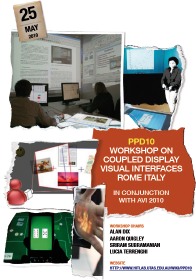 The PPD10 workshop on Coupled Display Visual Interfaces1 followed on from a previous event, PPD08 at AVI 2008 and also a workshop on “Designing And Evaluating Mobile Phone-Based Interaction With Public Displays” at CHI2008. The linking of public and private displays is something I’ve been interested in for some years and it was exciting to see some of the kinds of scenarios discussed at Lancaster as potential futures some years ago now being implemented over a range of technologies. Many of the key issues and problems proposed then are still to be resolved and new ones arising, but certainly it seems the technology is ‘coming of age’. As well as much work filling in the space of interactions, there were also papers that pushed some of the existing dimensions/classifications, in particular, Rasmus Gude’s paper on “Digital Hospitality” stretched the public/private dimension by considering the appropriation of technology in the home by house guests. The full proceedings are available at the PPD10 website.
The PPD10 workshop on Coupled Display Visual Interfaces1 followed on from a previous event, PPD08 at AVI 2008 and also a workshop on “Designing And Evaluating Mobile Phone-Based Interaction With Public Displays” at CHI2008. The linking of public and private displays is something I’ve been interested in for some years and it was exciting to see some of the kinds of scenarios discussed at Lancaster as potential futures some years ago now being implemented over a range of technologies. Many of the key issues and problems proposed then are still to be resolved and new ones arising, but certainly it seems the technology is ‘coming of age’. As well as much work filling in the space of interactions, there were also papers that pushed some of the existing dimensions/classifications, in particular, Rasmus Gude’s paper on “Digital Hospitality” stretched the public/private dimension by considering the appropriation of technology in the home by house guests. The full proceedings are available at the PPD10 website.
AVI 2010
AVI is always a joy, and AVI 2010 no exception; a biennial, single-track conference with high-quality papers (20% accept rate this year), and always in lovely places in Italy with good food and good company! I first went to AVI in 1996 when it was in Gubbio to give a keynote “Closing the Loop: modelling action, perception and information“, and have gone every time since — I always say that Stefano Levialdi is a bit like a drug pusher, the first experience for free and ever after you are hooked! The high spot this year was undoubtedly Hitomi Tsujita‘s “Complete fashion coordinator”2, a system for using social networking to help choose clothes to wear — partly just fun with a wonderful video, but also a very thoughtful mix of physical and digital technology.


images from Complete Fashion Coordinator
The keynotes were all great, Daniel Keim gave a really lucid state of the art in Visual Analytics (more later) and Patrick Lynch a fresh view of visual understanding based on many years experience and highlighting particularly on some of the more immediate ‘gut’ reactions we have to interfaces. Daniel Wigdor gave an almost blow-by-blow account of work at Microsoft on developing interaction methods for next-generation touch-based user interfaces. His paper is a great methodological exemplar for researchers combining very practical considerations, more principled design space analysis and targeted experimentation.
Looking more at the detail of Daniel’s work at Microsoft, it is interesting that he has a harder job than Apple’s interaction developers. While Apple can design the hardware and interaction together, MS as system providers need to deal with very diverse hardware, leading to a ‘least common denominator’ approach at the level of quite basic touch interactions. For walk-up-and use systems such as Microsoft Surface in bar tables, this means that users have a consistent experience across devices. However, I did wonder whether this approach which is basically the presentation/lexical level of Seeheim was best, or whether it would be better to settle at some higher-level primitives more at the Seeheim dialog level, thinking particularly of the way the iPhone turns pull down menus form web pages into spinning selectors. For devices that people own it maybe that these more device specific variants of common logical interactions allow a richer user experience.
The complete AVI 2010 proceedings (in colour or B&W) can be found at the conference website.
The very last session of AVI was a panel I chaired on “Visual Analytics: people at the heart of data” with Daniel Keim, Margit Pohl, Bob Spence and Enrico Bertini (in the order they sat at the table!). The panel was prompted largely because the EU VisMaster Coordinated Action is producing a roadmap document looking at future challenges for visual analytics research in Europe and elsewhere. I had been worried that it could be a bit dead at 5pm on the last day of the conference, but it was a lively discussion … and Bob served well as the enthusiastic but also slightly sceptical outsider to VisMaster!
As I write this, there is still time (just, literally weeks!) for final input into the VisMaster roadmap and if you would like a draft I’ll be happy to send you a PDF and even happier if you give some feedback 🙂
Search Computing
I was invited to go to this one-day workshop and had the joy to travel up on the train from Rome with Stu Card and his daughter Gwyneth.
 The search computing workshop was organised by the SeCo project. This is a large single-site project (around 25 people for 5 years) funded as one of the EU’s ‘IDEAS Advanced Grants’ supporting ‘investigation-driven frontier research’. Really good to see the EU funding work at the bleeding edge as so many national and European projects end up being ‘safe’.
The search computing workshop was organised by the SeCo project. This is a large single-site project (around 25 people for 5 years) funded as one of the EU’s ‘IDEAS Advanced Grants’ supporting ‘investigation-driven frontier research’. Really good to see the EU funding work at the bleeding edge as so many national and European projects end up being ‘safe’.
The term search computing was entirely new to me, although instantly brought several concepts to mind. In fact the principle focus of SeCo is the bringing together of information in deep web resources including combining result rankings; in database terms a form of distributed join over heterogeneous data sources.
The work had many personal connections including work on concept classification using ODP data dating back to aQtive days as well as onCue itself and Snip!t. It also has similarities with linked data in the semantic web word, however with crucial differences. SeCo’s service approach uses meta-descriptions of the services to add semantics, whereas linked data in principle includes a degree of semantics in the RDF data. Also the ‘join’ on services is on values and so uses a degree of run-time identity matching (Stu Card’s example was how to know that LA=’Los Angeles’), whereas linked data relies on URIs so (again in principle) matching has already been done during data preparation. My feeling is that the linking of the two paradigms would be very powerful, and even for certain kinds of raw data, such as tables, external semantics seems sensible.
One of the real opportunities for both is to harness user interaction with data as an extra source of semantics. For example, for the identity matching issue, if a user is linking two data sources and notices that ‘LA’ and ‘Los Angeles’ are not identified, this can be added as part of the interaction to serve the user’s own purposes at that time, but by so doing adding a special case that can be used for the benefit of future users.
While SeCo is predominantly focused on the search federation, the broader issue of using search as part of algorithmics is also fascinating. Traditional algorithmics assumes that knowledge is basically in code or rules and is applied to data. In contrast we are seeing the rise of web algorithmics where knowledge is garnered from vast volumes of data. For example, Gianluca Demartini at the workshop mentioned that his group had used the Google suggest API to extend keywords and I’ve seen the same trick used previously3. To some extent this is like classic techniques of information retrieval, but whereas IR is principally focused on a closed document set, here the document set is being used to establish knowledge that can be used elsewhere. In work I’ve been involved with, both the concept classification and folksonomy mining with Alessio apply this same broad principle.
The slides from the workshop are appearing (but not all there yet!) at the workshop web page on the SeCo site.
- yes I know this doesn’t give ‘PPD’ this stands for “public and private displays”[back]
- Hitomi Tsujita, Koji Tsukada, Keisuke Kambara, Itiro Siio, Complete Fashion Coordinator: A support system for capturing and selecting daily clothes with social network, Proceedings of the Working Conference on Advanced Visual Interfaces (AVI2010), pp.127–132.[back]
- The Yahoo! Related Suggestions API offers a similar service.[back]
morning newspaper: MPs and Elgin Marbles
I usually only read the newspaper when travelling and either do the ‘free mineral water with newspaper’ deal (usually the Telegraph, maybe the only way they can sell newspapers), or whatever they have in the hotel or plane.
The front-page news today is the Israeli attack on the Gaza aid convoy, which needs no further comment.
of MPs
However, I also got yesterday’s Independent when I arrived at the Holiday Inn near midnight. One of the main stories then was still the ‘outing’ and resignation of David Laws. The key issue here (at least in principle) was not that nature of his personal relationships, but that he had not disclosed that the flat on which he was claiming rent belonged to his partner.
I was glad to see Mark Pack’s commentary in today’s Independent take a robust view of this, noting that while Laws may have broken rules (still to be determined), there had been no financial gain involved, and indeed the arrangement had saved the taxpayer money. Pack’s contempt of the Telegraph was perhaps not unexpected in a column in a rival newspaper, but echoed my own feelings.
I was happily abroad during the height of the MPs expense ‘scandal’ last year, but was appalled at the coverage, not least because my travels take me to countries in Europe which would give anything to have the high standards of public office we take for granted in the UK. In the end a handful of MPs may (still sub judice) have abused the system, but the vast majority were simply trying to do their job.
A short while ago I happened on the web on a page detailing the expenses of a Cardiff (now ex) MP Julie Morgan, when MPs expenses came under the spotlight, she rechecked her previous claims and indeed, with more careful checking, it turned out that the claims she had made on her mortgage did not match the actual expenditure. Over the five years of the last parliament she had accidentally over-claimed in two years to the total of £800 … but in the other three years had under-claimed to the tune of £1900. The rules meant she could not retrospectively be paid for the under-claimed years, but did pay back the £800 for the over-claims. Despite being £1100 out of pocket, one of the lowest claiming MPs and indeed paying significant amount of her own salary to help maintain her constituency office, on the books she will part of the statistics of the large number of MPs who repaid expenses and so appear to have been doing wrong. Crazy!
and of Marbles
 Back to today’s newspaper and deeper into the Independent a very old story that is entering a new phase: the fight for the return of treasures from around the world displayed in British Museums. The most well know is of course the Elgin Marbles (maybe Germany may claim them as security for Greece’s Euro-bailout), but others include African treasures taken during punitive raids by British soldiers in the 19th Century.
Back to today’s newspaper and deeper into the Independent a very old story that is entering a new phase: the fight for the return of treasures from around the world displayed in British Museums. The most well know is of course the Elgin Marbles (maybe Germany may claim them as security for Greece’s Euro-bailout), but others include African treasures taken during punitive raids by British soldiers in the 19th Century.
The issues seem clear-cut for a Liberal-minded Independent reader, but maybe things are more complicated; certainly some of the items, including the bronze ‘Birmingham Buddha’ would not have survived to the present day if they had not been removed – if only the Victorian adventurers had also removed some of the giant Buddha statues destroyed by the Taliban in the 1990s.
I wonder how far repatriation should go, what is the statute of limitations for national treasure? Maybe as the Birmingham Buddha travels back to India, several hundred shiploads of railtrack and steam trains will be repatriated to the UK, offloaded at Felixstowe docks and moved overland to form a mountainous sculpture of piled steel in the centre of Birmingham.
 Having just been in Italy, I am sure there are many Italian artefacts in British museums, but then in Rome there are a number of Egyptian obelisk’s removed by the Romans 2000 years ago. However, I would be surprised if, in turn, the Egyptians had not taken artefacts from other parts of the ancient world. For that matter, what about the work done by the Israelites in Egypt before the Exodus? If not for the fear it might be taken seriously I might suggest Israel could claim this.
Having just been in Italy, I am sure there are many Italian artefacts in British museums, but then in Rome there are a number of Egyptian obelisk’s removed by the Romans 2000 years ago. However, I would be surprised if, in turn, the Egyptians had not taken artefacts from other parts of the ancient world. For that matter, what about the work done by the Israelites in Egypt before the Exodus? If not for the fear it might be taken seriously I might suggest Israel could claim this.
In fact, these treasures are often more symbolic of the greater rape of natural resources and human labour that still continues today in many parts of the world today. Indeed being brought up in the shadow of the South Wales coal valleys, I am well aware that the benefits of natural resources rarely go to the countries where they are found nor the labourers who mine them.
One of the key arguments against repatriation of ancient artefacts is that the curatorial standards are higher where they are presently. Indeed the pillage of Iraqi sites after the fall of Saddam could be seen as overwhelming evidence that institutions such as the British Museum do the whole world a service. Repatriation of artefacts to less secure countries would put at risk our shared global heritage; after all who knows what civilisation the UK and US will decide to decimate next.
